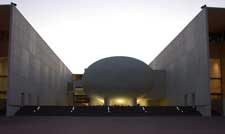Teaching and Undergraduate Education
Introductory Course Instruction and Curriculum Reform
I have had a longstanding commitment to undergraduate education, and specifically to the physics education of majors outside of physics including those in the life sciences, engineering and earth and atmospheric sciences. I have led major reforms of Physics 2207, introductory mechanics and heat for life science students, in 1999-2005, and of Physics 2214, oscillations, waves, and quantum physics, in 2008-2010 and 2015-2017, the most recent period as part of the College of Arts and Sciences Active Learning Initiative. These reforms have focused on deliberate practice / active learning and on motivating students by illustrating connections to applications they care about.
Features of Physics 2214 include:
- A curriculum designed through consultation (either directly or via surveys) with major stakeholders (Engineering faculty, students) and by examining materials for downstream engineering courses to maximize curricular integration and reinforcement;
- A 300 page set of lecture notes that serves as the primary reference for the course;
- A complete set of online lecture videos.
- On-line pre-lecture reading quizzes;
- Active learning in lecture through electronic polling (in continuous use at Cornell since 1972);
- A large collection of lecture demonstrations, including several new demonstrations developed specifically for this course;
- Extensive discussion of physics applications, many drawn from the specific disciplines/majors of the enrolled students, showing the broad reach of physics and the interconnectedness or "pattern" of scientific explanation;
- Lecture hand-outs with 10-20 multiple-choice questions per lecture (most for study outside of lecture), addressing key misconceptions identified in the PER literature and in our own observations, and including questions on lecture demonstrations and applications;
- Context-rich homework problems;
- Cooperative learning / problem based learning sessions with on-line answer checking and feedback;
- A study hall, open for several hours most days, staffed by graduate TAs and undergraduate TAs;
- An emphasis on transferrable skills used by all scientists and engineers, such as estimation, dimensional analysis, proportional reasoning, graphing and limits of functions, and use of log-log and semi-log plots;
- Explicit focus on teaching physics-specific study skills, including post-exam study skills "interviews" with students who score below a target grade;
- Explicit focus on providing emotional support/encouragement around exam times via email and in-lecture announcements;
- Anonymous on-line student feedback for risk-free and honest real-time communication about all aspects of the course;
- Pre-course and mid-course formative evaluations;
- Pre- and post-testing using a previous exam;
- Establishing norms for conduct via an online Academic Integrity IQ Quiz.
For my contributions to undergraduate education I received the Class of 72 Innovation in Teaching Award, a Faculty Appreciation Award from Cornell's Fraternities and Sororities, and a Faculty Innovation in Teaching Award. In 2011 I was named a Stephen H. Weiss Presidential Fellow, Cornell's highest recognition for teaching and advising.
Cornell's Undergraduate Teaching Assistant Program in Physics

Between 2008 and 2010, with support from the APS PhysTEC project and the Provost's office, Marty Alderman, Jim Overhiser (two regional high school physics teachers) and I established the Physics Department's Undergraduate Teaching Assistant (UTA) Program. I took over the program in 2011 after our external funding ended, and grew it from 20 to roughly 100 student participants per semester and from coverage of two to a dozen physics courses per year, including both introductory and physics major courses, between 2011 and 2018.
The Cornell Physics UTA program one of the largest and most successful Physics peer instruction programs in the U.S., and has been critical in supporting the expansion of active learning/deliberate practice methods in our courses and in expanding the support we provide to traditionally underrepresented and socioeconomically disadvantaged groups, including in our honors courses. The program is now run by Dr. James Baker. I have revamped and am currently teaching Physics 4484, our seminar course on Teaching and Learning Physics, taken by new UTAs and interested graduate students. Topics covered include question types and questioning strategies, facilitating classroom discourse, memory and learning, deliberate practice and expertise acquisition, mental models and conceptual change, psychological aspects of teaching in a diverse classroom, microaggressions, metacognition, multiple intelligences, learning styles, multiple representations, mindsets, creativity, willpower, what makes teachers effective and how to measure it, active learning and course design, and connections between human and machine learning.
International Education

In 2003 Cornell opened a branch of its Weill Cornell Medical School in Doha, Qatar. WCMC-Q is one of the founding programs of Education City, a visionary effort to bring world-class undergraduate and professional education to the Middle East. I have been involved with the premedical program there since 2003, and from 2004-2012 served as Course Director for Physics . The program draws students from the Middle East, Northwest Africa and the Indian subcontinent. I have lectured and given research and teaching seminars in Doha, provided annual program evaluations, and have hosted students from the program in summer research.